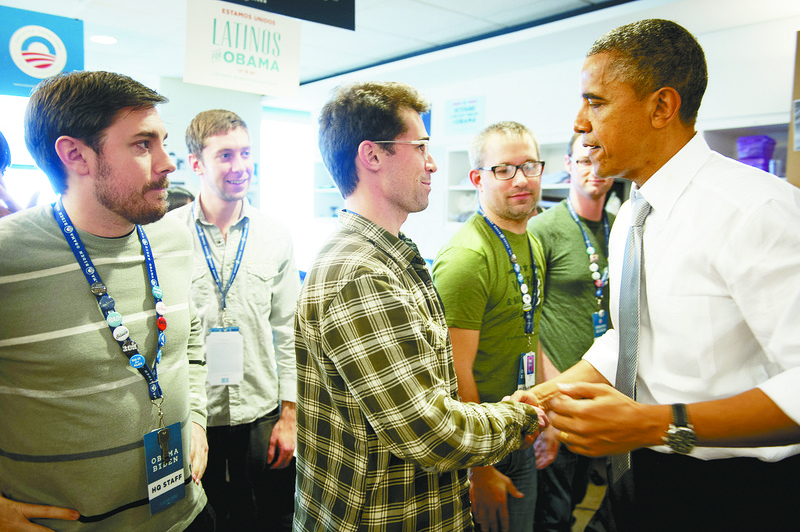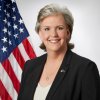In the last several weeks before November's election, Connor Gaffney watched the numbers of staff in his Chicago workplace steadily dwindle. “Everyone was headed out into the field to knock on doors and build support. That is where this election was won.”
When there were lulls in his programming work, Gaffney joined the others. “I headed out to Milwaukee and Janesville when I had the chance and talked to as many people as I could.”
The Cape grad was working in campaign headquarters for President Barack Obama. “From the point of view of the low man on the totem pole, the general strategy of the campaign was to turn out our supporters, especially those from the 2008 election who may not have been feeling the same level of excitement they did back then. Particularly African Americans and Latinos. We had to find them and target them effectively.”
Gaffney said his job was front-end web development – coding for the public side of the website. “Of course there was a huge amount of data on the back end. The technology department invested in by the Obama campaign – an in-house effort – built innovative and revolutionary software that hadn't been used before. That allowed the campaign to track voter behavior, supporter behavior.”
While Connor was working in the campaign's nerve center, his brother Nat – another Cape grad – was on the ground in Laramie County, Colo. “That was a swing county in a swing state,” said Connor. “He was one of 4,000 volunteer workers spread across the country sending information and receiving information daily to make their street-by-street efforts more effective. The software that was developed was more logistical than it was statistical. How to get data from 800 field offices, check it and process it and then turn it around for the workers. For example, how could we use supporter information to raise $5,000 from a certain 20 people in an outlying area in 48 hours? It was a very effective operation, especially in the battleground states. The volunteers were out there working hard, and our job was to help them do the best job they could.”
The result, said Gaffney, was a one of the strongest grassroots elections – maybe the strongest ever – in the nation's history, and a victory for Obama. “The Republicans were watching and are still looking at what happened. They knew the Obama campaign had done something new and did it well.”
Just a few months before . . .
Gaffney was no stranger to Chicago-style politics. After graduating from University of Chicago, he went to work for former Obama chief-of-staff Rahm Emanuel when he campaigned successfully for the Chicago mayor's position. Then, wanting to get away from the political scene for a while, Gaffney headed off to Cambridge University in England to further his education with a masters degree. Still, politics wasn't far from his mind. By June this year he had earned his degree in the history of political thought. After taking a little time off cycling around Europe with Nat, Gaffney came back stateside. Needing a job, he jumped at the opportunity to work for the Obama campaign when a friend in Chicago mentioned the web-developer position.
“When I arrived at headquarters, the campaign was into its final push,” said Gaffney. “Everyone was sleep-deprived and had been for six months. Fourteen hours a day, seven days a week. There was a feeling that we just had to do more, but our boss would have to tell people to go home at midnight and get rest, knowing that if we didn't, we would be tired and ineffective the next day.
Gaffney said the mood at headquarters was cautious. “There was no over-confidence or cockiness. A month out it became clear we were exceeding campaign objectives. We were doing all we could and then some, but still weren't sure how it would turn out. We had our heads down and were sprinting and definitely weren't looking back.”
The day after the election, the re-elected president stopped by headquarters to say thank you. “It was the first time I had seen him in person and heard him speak. There were probably 400 of us there, a small crowd by Obama standards. Very intimate, very personal. He was speaking off the cuff and to each person, choked up at times with tears in his eyes. He said we had all made him proud and knew we would do wonderful things to make the world a better place. He was sharing something deeply important to him. From a background of political organizing, he understood what the people on the street were doing – much more so than TV ads and super pacs. Many people thought that with the negative national narrative of high unemployment, big money would win the day – especially with the Citizens United decision that opened the floodgates for corporate money. So Obama's victory felt like a moral victory – that an efficient and effective in-house and grassroots organization could win over a campaign funded by a relatively few wealthy organizations. I think it showed that money will never absolutely trump the will of the people.”
Obama told the group that what they had learned could be applied down the line. “For him, there was a straight line from his knocking on doors in the south side of Chicago to signing bills as president in the White House. An unbroken chain. It's the stuff that ends up effecting political change.”
Gaffney relished the feeling of teamwork and ultimate success. “It makes a real difference if not just you – but the people you're working with – really care about the goal. And it's a democratic thing. Being an equal member of a group all working with a common purpose.”
For Gaffney, the experience confirmed much of what he encountered in his political history classes.
“Obama talked about creating consensus out of the cacophony and the pluralistic nature of the American democratic experience. It made me realize that democracy is in the exchange of ideas during encounters with your fellow man as an individual and an equal.”

















































